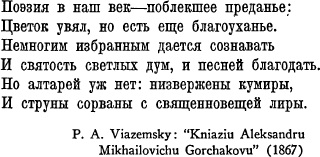Volume 28 - March 1969
Articles
Alexander I's Hundred Days: The Politics of a Paternalist Reformer
-
- Published online by Cambridge University Press:
- 27 January 2017, pp. 373-393
-
- Article
- Export citation
Military Self-Sufficiency and Weapons Technology in Muscovite Russia
-
- Published online by Cambridge University Press:
- 27 January 2017, pp. 185-208
-
- Article
- Export citation
Fate and Fantasy: A Study of Turgenev's Fantastic Stories
-
- Published online by Cambridge University Press:
- 27 January 2017, pp. 543-560
-
- Article
- Export citation
Nikita Panin, Russian Diplomacy, and the American Revolution
-
- Published online by Cambridge University Press:
- 27 January 2017, pp. 1-24
-
- Article
- Export citation
V. N. Karazin, the Gentry, and Kharkov University
-
- Published online by Cambridge University Press:
- 27 January 2017, pp. 209-220
-
- Article
- Export citation
The Reception of Pushkin's Poetic Works in the 1820s: A Study of the Critic's Role
-
- Published online by Cambridge University Press:
- 27 January 2017, pp. 394-415
-
- Article
- Export citation
Smoler's Idea of Nationality
-
- Published online by Cambridge University Press:
- 27 January 2017, pp. 25-47
-
- Article
- Export citation
The Communist Party of Czechoslovakia and the Czech Resistance, 1939-1945
-
- Published online by Cambridge University Press:
- 27 January 2017, pp. 561-576
-
- Article
- Export citation
Jewish Assimilation in Lvov: The Case of Wilhelm Feldman
-
- Published online by Cambridge University Press:
- 27 January 2017, pp. 577-590
-
- Article
- Export citation
Poets and Poetry in an Antipoetic Age
-
- Published online by Cambridge University Press:
- 27 January 2017, pp. 48-62
-
- Article
- Export citation
Balmont: A Reappraisal
-
- Published online by Cambridge University Press:
- 27 January 2017, pp. 221-264
-
- Article
- Export citation
Mayakovsky and Whitman: The Icon and the Mosaic
-
- Published online by Cambridge University Press:
- 27 January 2017, pp. 416-425
-
- Article
- Export citation
The Election of Archbishop Stablewski
-
- Published online by Cambridge University Press:
- 27 January 2017, pp. 265-275
-
- Article
- Export citation
The Young Czech Party (1874-1914): An Appraisal
-
- Published online by Cambridge University Press:
- 27 January 2017, pp. 426-444
-
- Article
- Export citation
Annularity as a Melodic Principle in Fet's Verse
-
- Published online by Cambridge University Press:
- 27 January 2017, pp. 591-603
-
- Article
- Export citation
The Private Sector in Soviet Agriculture
-
- Published online by Cambridge University Press:
- 27 January 2017, pp. 63-71
-
- Article
- Export citation
M. N. Pokrovsky and Soviet Historiography: Some Reconsiderations
-
- Published online by Cambridge University Press:
- 27 January 2017, pp. 604-618
-
- Article
- Export citation
Pilsudski and the Slovak Autonomists
-
- Published online by Cambridge University Press:
- 27 January 2017, pp. 445-462
-
- Article
- Export citation
Notes and Comment
The Question of a Standard Gauge for Russian Railways, 1836-1860
-
- Published online by Cambridge University Press:
- 27 January 2017, pp. 72-80
-
- Article
- Export citation
Articles
Herbert Hoover's “Treaty” with Soviet Russia: August 20, 1921
-
- Published online by Cambridge University Press:
- 27 January 2017, pp. 276-288
-
- Article
- Export citation

